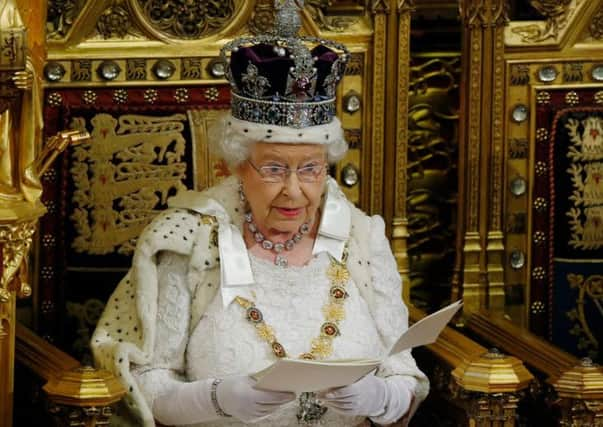The plans that will be revealed in today's Queen's Speech


From giving rural schools a financial boost to raising student tuition fees, the Government’s plans cover many areas affecting everyday life for people in Yorkshire.
As ever, some ideas are more controversial than others. Which proposals do you think are a good idea?
Extremism:
Advertisement
Hide AdAdvertisement
Hide AdThis Bill would give the Government new powers to ban extremist organisations that promote hatred and draw people into extremism; restrict the harmful activities of the most dangerous extremist individuals; and restrict access to premises which are repeatedly used to support extremism. It is due to be the main focus of this year’s speech. The Daily Telegraph reported that new laws will ban hate speakers from working with children and other vulnerable groups, “in the same way that paedophiles are vetted to stop them being given jobs in schools”.
Schools:
The Department for Education published a White Paper, Educational Excellence Everywhere, which set out that all schools would become academies by 2020. It caused some embarassment earlier this month when the Government did a U-turn and said they would not bring about the “blanket conversion of all schools to achieve this goal.”
Teachers welcomed the announcement before Christmas that the Government would consult on a new national school funding formula. It is expected that this will feature in a Bill of its own and would involved changes in how funding is allocated by 2019-20. This will be a major win for Conservative Yorkshire MPs, including Graham Stuart (Beverley and Holderness) and Rishi Sunak (Richmond) who have been campaigning for fairer funding.
Higher Education:
The Department for Business, Innovation and Skills published it white paper, Success as a Knowledge Economy: Teaching Excellence, Social Mobility and Student Choice, on Monday. This includes the proposal to allow universities with a good teaching record to charge fees higher than £9000 a year. Likely to be very unpopular with students.
Marriage Certificates:
Advertisement
Hide AdAdvertisement
Hide AdAn easy crowd pleaser for the Government to plough ahead with. Following debates in the House of Commons and positive noises from Government this is very likely to become law in the next Parilamentary session. In the future, marriage certificates will include the name of the mother of the bridal party, and not just the father.
Tax evasion:
Following the Panama Papers leak into offshore firms enabling people to avoid paying UK tax, the Prime Minister said the Government would make it a new criminal offence for companies to assist with tax evasion.
Chancellor George Osborne backed this up in April, when he said: “this will be in the Queen’s Speech—a new criminal offence of facilitating tax evasion, which will apply to the corporate sector in Britain as well”.
Driver sentences:
It was reported in the Daily Telegraph that sentences for drivers who kill people on the roads could be increased. This will be warmly received by bereaved families in Yorkshire who have been campaigning for changes for several years.
British Bill of Rights:
Advertisement
Hide AdAdvertisement
Hide AdThis was a draft Bill in the 2015-16 session but wasn’t heard and may return in the next 12 months. Dominic Raab, the Parliamentary Under-Secretary of State for Justice, told the House of Commons recently that “We look forward to presenting proposals for a Bill of Rights in due course, and we will consult on them fully”. The Bill is intended to curb the influence of the European Court of Human rights, and would replace the Human Rights Act.
Strathclyde Review:
The Government called for the House of Lords to lose its ability to veto a statutory instrument - a form of legislation implemented without Parliament having to pass an Act. This was after George Osborne’s plan to cut £12bn of tax credits in October voted down by Lords. Conservative peer Lord Strathclyde recommended that peers should be limited to asking MPs to “think again” about planned legislation, leaving the final decision to the elected House of Commons.
Prisons:
A draft prison reform bill led by Justice Secretary Michael Gove will set out the legal framework for new prisons with strong governors and a degree of autonomy over budgets and the deployment of staff. The bill will also include powers for “reform prisons” to take over nearby failing jails on the same model as the development of school academy chains.
Privatisation of Land Registry Bill:
Intention to privatise the Land Registry was announced during the Autumn Statement 2015. A consultation process, which closes on 26 May 2016, is underway.
What other laws are still being considered?
Advertisement
Hide AdAdvertisement
Hide AdIt is not always possible to get through everything outlined in a Queen’s Speech in one Parliamentary session. This might be due to time, but rarely, because Bills are defeated.
The following bills are being carried over from the 2015-16 Session:
Policing and Crime Bill
Investigatory Powers Bill
High Speed Rail (London - West Midlands) Bill
Finance (No 2) Bill
Three other bills were announced in the May 2015 Queen’s Speech but not introduced. Legislation in these areas is still expected by ministers and includes:
Buses
In a nutshell, this will increased bus passenger numbers. Andrew Jones, the Conservative MP for Harrogate and Knaresborough and Parliamentary Under-Secretary, Department for Transport, said they are still working on it.